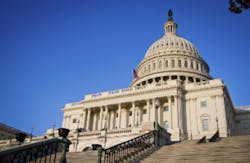U.S. representative reintroduces Water Supply Cost Savings Act in Congress
WASHINGTON — The Water Supply Cost Savings Act, H.R. 1160, has been reintroduced in Congress by U.S. Representative Marlin Stutzman, according to a press release.
The bill aims to reduce local, state and federal costs of providing high-quality drinking water to millions of Americans in rural communities by increasing the use of cost-effective alternatives such as water well systems, stated the release.
The U.S. Environmental Protection Agency’s (EPA) 2011 Drinking Water Needs Survey reported “the shortfall in drinking water infrastructure funding for small communities of less than 3,300 residents is more than $64 billion,” continued the release.
The Water Supply Costs Savings Act, reported the release, will help close the gap in funding by supplying rural communities with the resources and knowledge necessary to utilize alternative drinking water systems like community and individual water well systems.
If passed, noted the release, the bill will create a Drinking Water Technology Clearinghouse under EPA and USDA to generate and distribute information on the cost effectiveness of alternative drinking water systems to rural communities seeking federal funding for 500 or fewer people for drinking water systems.
"The Savings Act will provide critical information on how small communities can meet critical water needs cost effectively while supporting American manufacturing and jobs," said Water Systems Council President Steve Anderson. "The efficacy of water wells as a reliable, low-cost way to provide access to safe drinking water has been proven by projects already completed through the Water Well Trust that have realized costs savings of as much as 94 percent over conventional, long-pipe drinking water systems."
Read the entire release here.
